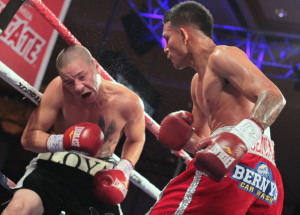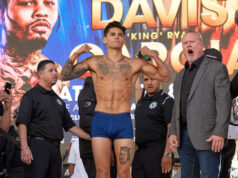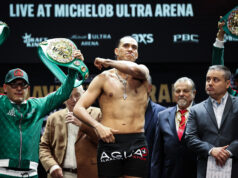
It’s hard not to think about Jose Benavidez Jr. while watching the sad and inevitable demise of American boxing at the London Olympics. In another time, Benavidez would have been there. But today that time looks lost in the collapse of an American tradition. For nearly a century, the American men dominated the medal count. In London, they couldn’t count one. They were shut out for the first time ever.
Some of the best Americans just don’t go anymore. Pick the reason: Disarray in USA Boxing or computer-based scoring system, or coaching, or 24 years of controversy since Roy Jones Jr. and Michael Carbajal were robbed of gold at the infamous 1988 Games, or all of the above.
“It’s just not the way it used to be anymore,’’ said Benavidez, 20, an unbeaten junior-welterweight prospect from Phoenix who was projected to be a star for the 2012 U.S. team before he signed with Top Rank as a 17-year-old. “A lot of guys just go pro. That gold medal isn’t worth what it used to be.’’
The computer-scoring, Benavidez says, is the biggest reason he went pro.
“I decided I didn’t want to continue boxing as an amateur because of that system,’’ said Benavidez (16-0, 13 KOs), who on Nov. 4 fought in Las Vegas instead of London, winning a fourth-round stoppage over Javier Loya. “It’s just throw- throw-throw, throw as many punches as fast as you can. But sometimes, you might land two shots and they won’t score them. It was just frustrating, real hard to understand.
“All along, I’d been taught to fight like a pro. I like to take more time, set up my shots. It just made more sense to go straight to the pros when Top Rank made me that offer. I don’t have any regrets. None at all.’’
Benavidez knows all about the long run of Olympic controversy, which continued in London with a referee who was expelled from the Games after he failed to rule a single knockdown in a round when the same fighter was on the canvas six times. But the controversies are older than he is. Benavidez wasn’t even born when Jones and Carabjal, also of Phoenix, lost at the Seoul Games in controversial scoring by judges who were linked to suspected bribes in the subsequent disclosure of old East German secret police files.
Still, the uninterrupted controversies have devalued the gold medal once so important in launching a pro career. For the best American amateurs, it also has created a culture in which the Olympics are no longer a priority.
Before the 2004 Olympics, I recall an interview with Rafael Valenzuela, then a terrific amateur with the kind of hand speed that might have been able to score with keypad punchers posing as judges. Valenzuela, a Phoenix featherweight, represented the U.S. in the 2003 World Championships in Thailand. In the ready room before a preliminary bout, Valenzuela said a Cuban looked at him and told him:
“You’re an American. Why did you Americans even come here? You’re going to get screwed.’’
Valenzuela came home and quickly went pro.
USA Boxing has a lot of work to do and perhaps a few good ideas about how to rebuild its Olympic fortunes. One plan includes a permanent national coach, instead of the patchwork collection of coaches. The revolving door continued to cripple American chances in London with the April dismissal of Joe Zanders and the late hiring of his replacement, 2004 coach Basheer Abdullah, who wasn’t allowed to work any American corner in London reportedly because he worked with a pro.
Lost in the shuffle was Freddie Roach, the Hall of Fame trainer who amid much fanfare had offered to work as a consultant, yet ultimately was rebuffed. Roach worked with a few of the Americans. Yet, Roach never made it to London.
No wonder the Americans looked confused. From day-to-day and perhaps from round-to-round, they didn’t know who would be in their corner. A permanent national coach might be a good step. But that coach will have to change a culture in which an Olympic medal has mattered less and less. After London, it doesn’t matter at all.
QUOTES, ANECDOTES
· There’s been a lot of talk about sending pros in a bid to re-assert American dominance in the same way USA basketball did in 1992 with the Dream Team. Even a roster including America’s best pros, however, might have had a tough time in London. “Most of our pros would lose, because they don’t understand that scoring system,’’ Roach said. Muhammad Ali, now an Olympic icon and a light-heavyweight gold medalist in 1960, might have had a tough time winning if the computer had been at ringside for the Rome Games.
· In terms of media perception, America’s failure to medal is devastating. But mainstream media in the U.S. doesn’t care about boxing anyway. No American medal figures to have no impact on the pro game. Here’s why: Mexico didn’t win a medal either. Medal hopeful Oscar Valdez, a bantamweight from Nogales on the other side of the border from Arizona, was eliminated, 19-13, by Ireland’s John Joe Nevin. Mexico is the world’s best boxing country. Without Mexican fighters and fans, the pro game wouldn’t be the same. For boxing’s most important audience, the medal count doesn’t count.
Photo by Stephanie Trapp










